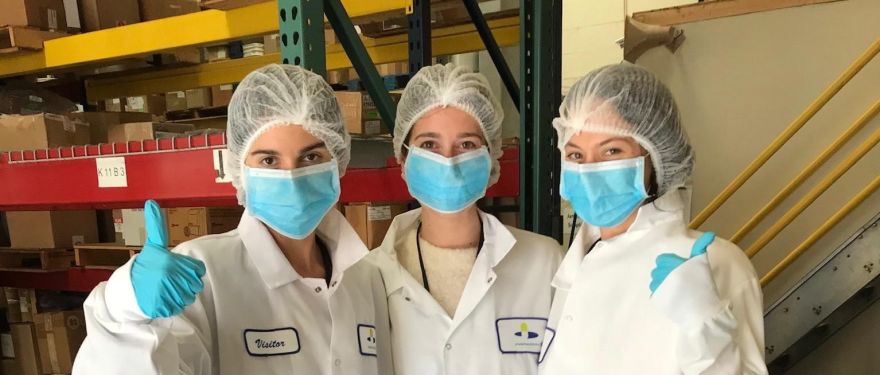Nina Mullen and Hilary Quartner are both from the HBS MBA Class of 2017. Nina has deep strategy and consumer products experience, notably at Bain & Company and Harry’s (where she focused on launching Harry’s at Target). Most recently, Nina led launch and operations for new business lines at Dia&Co as well as their private label business. At Hilma, Nina leverages her expertise launching innovative products in the DTC and retail space, her Harvard MBA, and personal experiences of being raised by two doctors. Nina collaborates with the scientific advisory board on leading Hilma’s unique research and development process, manufacturing and clinical research strategy as well as offline retail. Hilary has a finance, consumer products and retail background, notably as brand manager of FIJI Water. Most recently, Hilary led strategy and finance for Jetblack, a Walmart-incubated start-up that pioneered conversational commerce. At Hilma, Hilary leverages her personal passion for consumer products and integrative health with her Harvard MBA, and impressive professional history of launching new consumer brands, to build and operate Hilma's online retail channels, growth marketing and finance. Hilary is focused on ensuring the customer experience is executed flawlessly – from first click to product delivery.
Our entrepreneurial journey in some ways can be mapped back to one of the first parties during RC year. We met in a friend’s apartment prior to the event and immediately bonded over a shared love of India (we both lived there at various times), startups, and the natural foods space. We even realized that we had a mutual friend who then turned out to be one of our first investors when we started Hilma!
So today we want to share how two seemingly risk averse people (Hilary Quartner started her career in banking at Credit Suisse and Nina Mullen started her career in consulting at Bain) ended up starting a natural remedies brand, Hilma.
Our process before taking the entrepreneurial leap:
1. Have an idea that you actually care about
As our friendship continued to develop over our two years at HBS, it became clear that we both loved the idea of starting a business and had complementary temperaments. We casually discussed starting something in the food space (which we are both passionate about) but we never had an idea that either of us thought was worth the opportunity cost. We did not force it and each went our separate ways after graduation, accepting roles at other startups in New York.
Of course, the “aha" moment for Hilma happened at a completely random time with Nina and Hilma’s third co-founder, Lily Galef. We had a moment of shock when we looked at the label of a common immune support product, one of those sugar-y Vitamin C packets, and realized that this trusted product we had always turned to was loaded with sugar, additives and flavorings. Nina and Lily brought this realization to Hilary, and together, we all wondered why the natural remedies we had had personally found success with were absent from pharmacy shelves, and why we had a different standard for the labels in our medicine cabinets than we did for products everywhere else. The more we searched, the more we came to understand that the product category we sought – a scientifically backed, natural solution to help us feel better – didn’t exist.
2. Diligently research the idea to pressure test both the concept, but also, your commitment
Once you have an idea you care about, you start to think about it All. The. Time. This phase is incredibly important to see if your excitement tires as you answer the very important questions: Am I willing to think about this problem every day, for years? What is every single doubt or concern I have? Do I want to tell everyone I know about this? What am I willing to give up (precious time with friends and family, other interesting jobs, money!) to make this happen?
Since this phase is so essential, we tried to put as much structure around it as possible, forcing ourselves to do customer research (surveys, focus groups, Minimum Viable Product tests) and competitive research with self-imposed deadlines to help keep us on track.
3. Build a team you trust before you leave your job
The success of any idea relies on the ability of a team to work together and execute. So, as we worked nights and weekends to conduct our diligence, pull our initial pitch together, and ensure that the right experts were in place, we were also learning about our team dynamic. During that time, we got a sense of what it felt like to work together in a professional capacity beyond friendship, and discussed all of the challenges we could encounter as a team. In many ways this time was crucial to preempting difficult moments down the line and to gaining trust in each other.
4. Force yourself to pitch to people whose opinions you care about
We pushed ourselves to pitch our idea, even when we knew all of the questions weren’t perfectly answered, to people whose opinions we trusted. Sometimes the feedback was difficult, and sometimes it was great, but it was always helpful.
Ensure that you talk to a range of people with objective and valuable perspectives –that means not just your family and friends. Leverage your network (for us that was from HBS) of people who work in investing, other relevant businesses, and those who have founded companies before to make sure your ideas and approach pass muster.
5. Try to talk yourself out of it :)
It is going to be a long, challenging road. Be honest with yourself –if you’ve confronted the hardest parts of what could come, and you STILL think it’s worth it, you’re on your way.

